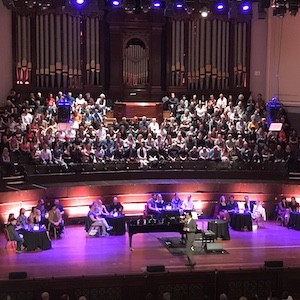Surrounded on all sides by an audience of devoted fans, Nick Cave introduces the format of the evening: he will perform songs with only a piano and field questions from the audience, with no subject off limits. An experiment in vulnerability and intimacy, the show is a continuation of the dialogue he maintains with fans and followers on The Red Hand Files. Yet it is never in doubt that he is in control, commanding the stage with his brooding form and conducting the audience with his thoughtful responses and choices of music.
With topics ranging from his favourite colour (yellow), to the creative process, God and mythology, there is an openness between the audience and Cave which creates a feeling of mutual trust. The questions are inquisitive without being intrusive, his answers enlightening, thoughtful and funny. Humour proves key to the proceedings, allowing Cave to duck certain questions and further win over the already devoted audience. He is generous with his advice for managing grief and adversity and finding a way to ultimately remain productive and inspired.

The highlights of the evening come when the lights dim and Cave begins to play the piano, the focus shifting straight to the centre of the stage. With a loose setlist and inspired by audience requests and questions, he performs a varied repertoire. The piano is played with urgency; percussive and dissonant. Although stripped back to their chords, the songs feel in no way sparse or lacking and the simple format brings an intimacy to the performance. His voice is extraordinarily resonant in the hall and his lyrical genius, which is discussed throughout the night, is emphasised by the lack of staging and instrumentation.
It is a credit to Cave that there are songs he refuses to play through fear he won’t do them justice, or simply not knowing the chords, and questions he wraps up with a single sentence. Yet he throws in plenty of unexpected moments, like the Grinderman song ‘Palaces of Montezuma’ (at the request of a young fan), Leonard Cohen’s ‘Avalanche’ and a T.Rex cover.
Themes develop over the course of the evening through the audience’s questions, and while many are humourous and thoughtful, there is a sense towards the end that perhaps he isn’t being asked exactly what he wants. One question deals with the problem of meeting one’s idols and the subsequent regret of failing to ask certain crucial questions. The irony of this is not lost, and while some questions are thoughtful, many are more of an outpouring of admiration for Cave. Almost too often, the conversation turns to God, grief and meaning. Yet his opinions are succinct and fascinating, especially when discussing songwriting, creative collaborations, his influences and rock and roll. He is quick to quash applause for some of his opinions and statements, as though he is aware of his position and doesn’t want undue weight to be given to his opinions, instead asking the audience questions in return and opening up the dialogue.
Conversations With Nick Cave is a unique, raw and arresting evening of conversation and music, where Cave’s ideas and influences are laid bare and are apparent in the stripped-back, yet hugely resonant music. He fills the stage and enchants the audience, and although claims to be vulnerable,is clearly in control, as his interrogators are his loyal fans. He comes across as modest, yet generous. He is warm and forthcoming in sharing his experiences, his music and creating common ground.
- Saint Frances (2020) - 3rd July 2020
- Anthropocene: The Human Epoch (2019) - 2nd July 2020
- Brotherhood (2019) - 11th October 2019
